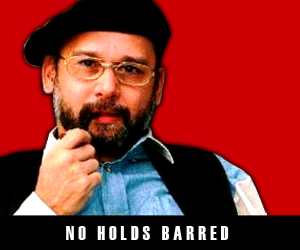Hence the Bosnian-Serbian conflict was as much a religious war as it was a territorial conflict. It was an old fight between the Orthodox Christians and the ‘deviant’ Bogomil Christians who had become even more deviant by converting to Islam.
NO HOLDS BARRED
Raja Petra Kamarudin
When the Bosnian-Serbian conflict first broke out some Muslims were saying that this was God’s punishment on the Bosniaks. The Bosniaks were Muslims in name only, they argued, and were not Muslims in spirit or practice. They did not pray and ate pork and drank liquor.
Actually, the Bosniaks were originally Bogomils, which was a sect of Christianity. I quote here whatEncyclopædia Britannica has to say on the matter:
Bogomil is member of a dualist religious sect that flourished in the Balkans between the 10th and 15th centuries. It arose in Bulgaria toward the middle of the 10th century from a fusion of dualistic, neo-Manichaean doctrines imported especially from the Paulicians, a sect of Armenia and Asia Minor, and a local Slavonic movement aimed at reforming, in the name of an evangelical Christianity, the recently established Bulgarian Orthodox Church. The Bogomils were so called after their founder, the priest Bogomil.
The Bogomils’ central teaching, based on a dualistic cosmology, was that the visible, material world was created by the devil. Thus, they denied the doctrine of the incarnation and rejected the Christian conception of matter as a vehicle of grace. They rejected Baptism, the Eucharist, and the whole organisation of the Orthodox Church. The moral teaching of the Bogomils was as consistently dualistic. They condemned those functions of man that bring him into close contact with matter, especially marriage, the eating of meat, and the drinking of wine. In fact, the moral austerity of the Bogomils invariably was acknowledged by their fiercest opponents.
During the 11th and 12th centuries Bogomilism spread over many European and Asian provinces of the Byzantine Empire. Its growth in Constantinople resulted, about 1100, in the trial and imprisonment of prominent Bogomils in the city and in the public burning of their leader, Basil. In the second half of the 12th century, it spread westward. The Serbian ruler Stefan Nemanja was obliged to summon a general assembly of his land to check it. Roman Catholic authorities were greatly disturbed by reports of heresy in Dalmatia and Bosnia (though modern scholarship casts doubt on the theory that the Bosnian church ever adopted the dualist theology of the Bogomils). By the early 13th century the dualistic communities of southern Europe—comprising the Paulicians and Bogomils in the east and the Cathari in the west—formed a network stretching from the Black Sea to the Atlantic.
In the 13th and 14th centuries, Rome dispatched several legations and Franciscan missionaries to convert or expel Bosnian heretics, among whom there may have been some Bogomils. In the country of its birth Bogomilism remained a powerful force until the late 14th century. The Bulgarian authorities convened several church councils to condemn its teachings. With the Ottoman conquest of southeastern Europe in the 15th century, obscurity descended upon the sect. Traces of a dualistic tradition in the folklore of the South Slavs are all that remain today of the most powerful sectarian movement in the history of the Balkans.
When the Bektashi Sufi Order began spreading through the Balkans, the Bosniaks found that this Muslim movement was very similar to Bogomil Christianity in beliefs and doctrine.
Because the Bogomil Christians suffered at the hands of the Catholic Christians, many decided to convert to Islam, which they found very compatible to Bogomil Christianity. As Christians the Bogomils suffered at the hands of Christians. As Muslims they were spared persecution. Hence it was better to become a Muslim than remain a Christian.
When the Ottomans came, it made even more sense to convert to Islam. The Ottomans did not care what sect of Christianity you belonged to and would not persecute you for following the ‘wrong’ sect. Christians had to pay tax while Muslims paid zakat. Hence there was more financial benefit in becoming a Muslim plus it was safer.
In the 15th century there were eight times as many Christians as Muslims in Bosnia. By the 16th century, half the people in Bosnia were Muslims. And they became Muslims because it was safer than remaining a Christian of the ‘wrong’ sect.
Hence the Bosnian-Serbian conflict was as much a religious war as it was a territorial conflict. It was an old fight between the Orthodox Christians and the ‘deviant’ Bogomil Christians who had become even more deviant by converting to Islam.




No comments:
Post a Comment
Note: Only a member of this blog may post a comment.